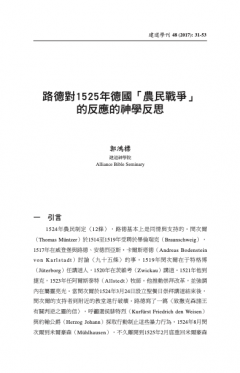路德對1525年德國「農民戰爭」的反應的神學反思/郭鴻標
郭鴻標
撮要
1524年農民制定〈12條〉,要求經濟正義。 1525年春天農民使用武力佔領德國西南部四十多間修道院。路德發表〈和平訓誡〉,當路德發現農民要徹底革命推翻現有的社會制度後,他寫了〈反對農民殺人搶掠〉與〈有關嚴斥農民的一封公開信〉,批評農民的暴力行為。本篇文章分八部分:第一部分農民制定〈12 條〉與路德的〈和平訓誡〉,第二部分路德的〈反對農民殺人搶掠〉與〈有關嚴斥農民的一封公開信〉,第三部分路德對和平與暴力的看法,第四部分路德對自由與權利的看法,第五部分路德對法律的看法,第六部分路德的兩個國度的思想,第七部分路德的政治倫理,第八部分從路德的政治倫理引申的「政教分離」觀。
ABSTRACT
The Peasants published “The 12 Articles” to ask for economic justice in 1524. The Peasants occupied more than 40 monasteries in South West Germany. Luther wrote “Admonition to Peace: A Reply to the 12 Articles of the Peasants in Swabia.” When the peasants demanded for radical revolution to overthrow the establishment, Luther published “Against the Murdering Thieving Hordes of Peasants” and “An Open Letter on the Harsh Book against the Peasants” criticizing the violent action of the peasants. This article is divided into 8 parts: (1) The Peasants issued “The 12 Articles” and Luther’s “Admonition to Peace,” (2) Luther’s Against the Murdering Thieving Hordes of Peasants” and “An Open Letter on the Harsh Book against the Peasants,” (3) Luther on Peace and Violence, (4) Luther on Freedom and Right, (5) Luther on Law, (6) Luther on Two Kingdoms, (7) Luther’s Political Ethics, (8) The Implication of Luther’s Political Ethics for “Separation of Politics and Religion.”
原載於《建道學刊》48期(2017年7月),頁 31-53。
作者簡介
郭鴻標
副院長 (行政)








